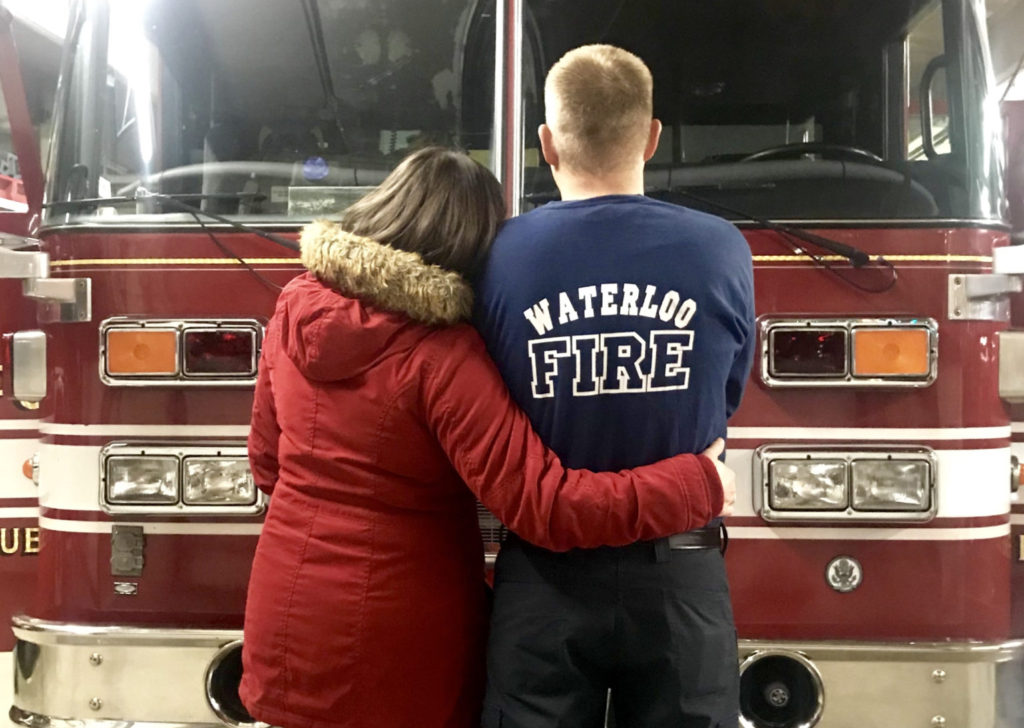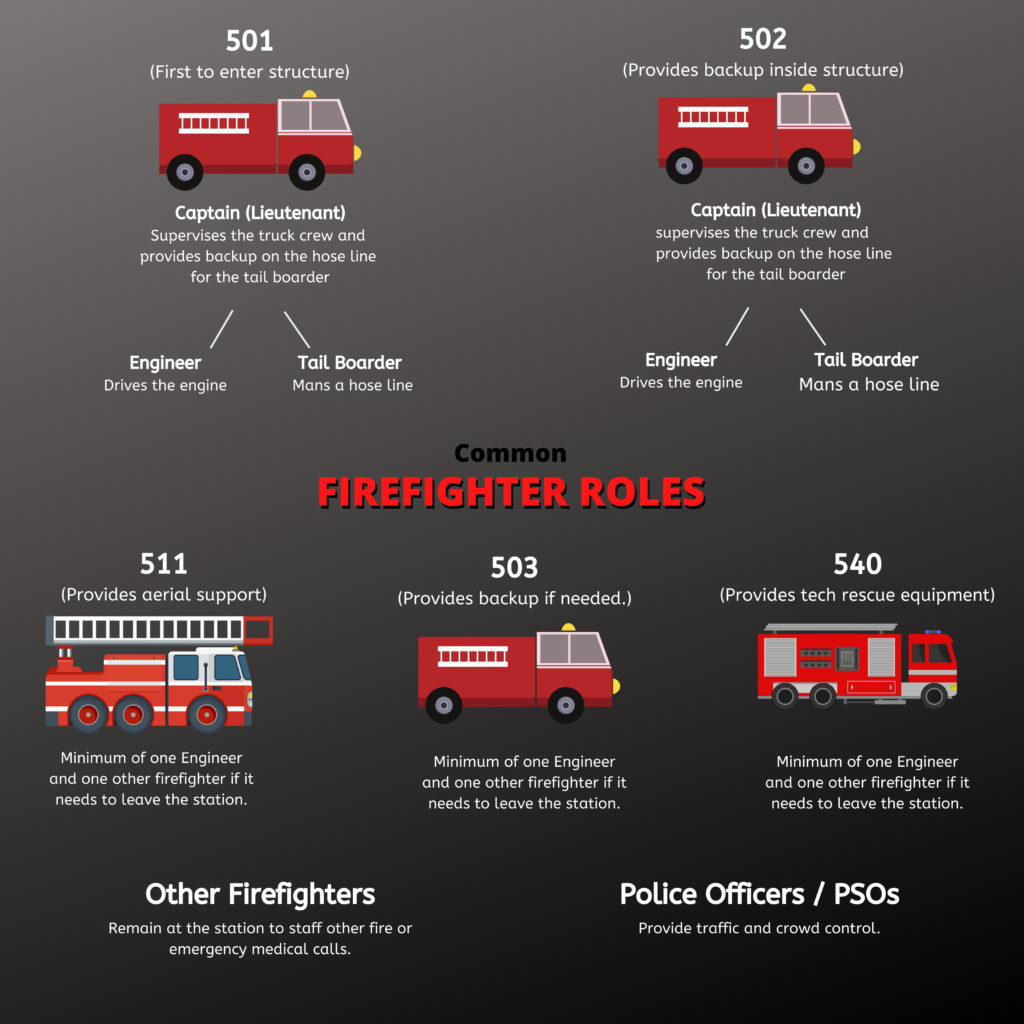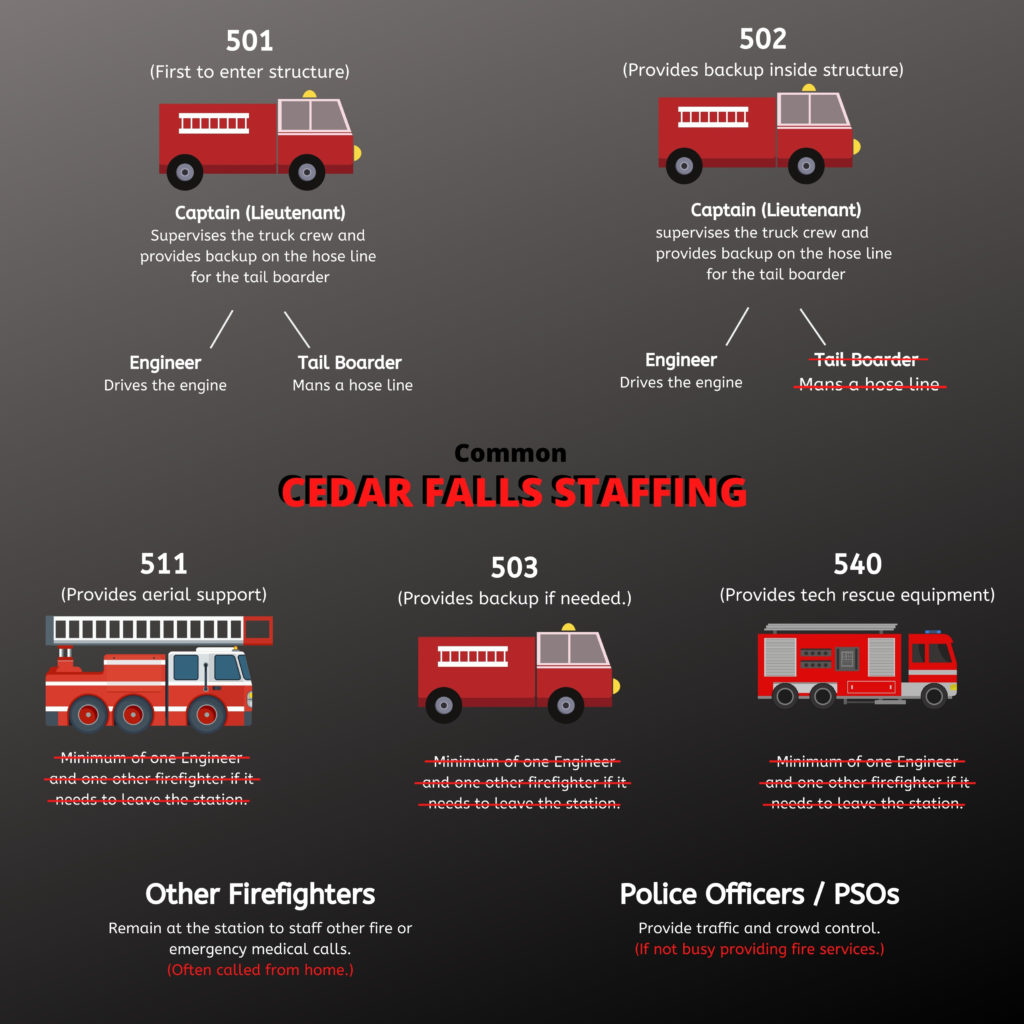I’m often asked if I get nervous when my husband, a Waterloo firefighter, is on shift at the fire station. Do I fear for his life? Honestly speaking, no. It’s rarely a thought that passes through my mind. Let’s be clear. It’s not because the job isn’t dangerous. Just last week, a firefighter in Waterloo fell through the floor of a burning structure. He wasn’t seriously injured, but that ending could have been a lot different. On many occasions, my husband rides an ambulance (he’s also a paramedic). He picks up drug addicts, stabbing victims, and criminals who have been shocked by tasers. Even then, I worry little for his safety. Why?
Because I know his mayor, his chief, his lieutenant, his crew, all have his back. They provide him with the best equipment, the best manpower, and the best training they can so that he can do his job safely. And I trust them. That firefighter who fell through the burning floor was rescued by fellow firefighters. Fellow firefighters who were close enough in proximity, trained enough, and quick-thinking enough to know what to do in a split second. I’d venture to say that situation could’ve looked much different had it happened in Cedar Falls. And I’m sure if you asked a Cedar Falls Firefighter Wife that same question about their husband’s safety, you would get a much different answer.

Let me help you understand what most of the general public may not fully comprehend. Something that has been lost in this whole public safety debate. For far too long, Cedar Falls has been operating on slim pickings when it comes to fire safety. Because they have Public Safety Officers (PSOs) in place, they don’t always fully staff the fire station, leaving trucks unmanned. The reasoning being they don’t need a lot of bodies at the fire station sitting idle, because bodies are patrolling that can respond in the event of an emergency.
Understanding Fire Services
To understand the magnitude of just how understaffed Cedar Falls is leaving our firehouses, you need to understand the responsibilities of each person involved in a fire. The city has five major players: three engines, a ladder truck used for aerial attack on fires and high rise structures, and a rescue truck which carries special equipment too big for the regular engines…things like Jaws of Life, and confined space rescue equipment. In order for a truck to leave the station, it needs, at minimum, two personnel: a driver, who has special training to operate a truck, and a captain (or lieutenant in Waterloo). Only during extreme circumstances, or when following another truck, will an engine be manned by just one individual. Imagine operating a massive, multi-ton piece of equipment with no one to provide extra watch on blind spots, or in a tight situation with no one to assist with backing up or other maneuvering. In order for a crew to enter a burning structure, a minimum of six (ideally nine) personnel is needed. Typically one engine will be the “first-in” crew with the tail boarder at the front of the hose line, a captain (or lieutenant) behind the tail boarder on the hose line, and the driver will remain with the truck to monitor the pump and ensure the safety of the truck. Typically a second engine crew that mirrors the first will provide backup to the first crew inside the structure. Then a third engine with a third crew, mirroring the other two, will provide backup outside the structure. The rescue truck, with a minimum of two personnel, will arrive to assist with any special equipment needs. The ladder truck, with a minimum of two personnel will arrive for aerial attack of the fire. Additional bodies remain at the station to handle any other fire or medical emergency calls throughout the city that may come during the fire. In Waterloo these bodies are already on shift. In Cedar Falls, most of these positions needed back at the station are filled when a “call back” is issued and those bodies come from home to help. And that’s just how the fire services are handled. There are other needs on scene such as crowd and traffic control that are often supported by police, or in the case of Cedar Falls, PSOs. If there’s any suspicion of people trapped inside, medical support will arrive in the way of ambulances and paramedics.

What I’ve just described is very common staffing for fire services. In fact, our sister city, Waterloo, provides even more support than what I’ve just described. What’s most concerning in Cedar Falls is that while the city will fully staff one, maybe two trucks at a station, city administrators have made the call to not assign bodies to secondary trucks like the ladder truck, the rescue truck, or the “back-up” engine 503. And sometimes, will even leave engine 502 at the 18th Street station with just two personnel.They assume if those trucks are needed, the commanding officers can adjust staff on the fly if needed, rely on PSOs patrolling, or worse yet, wait for a “call back” and more staff to arrive. Sounds simple enough – an efficient system that utilizes all bodies to the maximum potential. Few bodies sitting idle in a “rest and ready” position.

A Flawed Sense of Order
But this is why the city’s reasoning, the basis of the their PSO model, is flawed, unsafe, and potentially deadly when used in practical application.
A firefighter (or PSO serving as a firefighter) doesn’t decide willy nilly what engine they’ll ride for a shift. It’s an assignment – given by the higher ups. Usually the day before a shift, one of the commanding officers will distribute the staff for the shift coming in the next day – fully staffing as many trucks as possible with the available manpower given to them by city administrators. When a firefighter (or PSO) is assigned to a truck, he or she also does not decide on their own accord if/when they’ll move to a different truck. Again – it’s a decision that is analyzed by a commanding officer after having a chance to carefully review what changes need to be made. It’s a decision that should not be taken lightly or made on the fly. It’s the only way things can operate smoothly when the alarm sounds.
So what happens when the city has restricted the resources available to a commanding officer? What happens when a commanding officer doesn’t have enough bodies to fully staff every truck? They are forced to decide on the lesser of the evils for the day. Most will choose to fully staff two engines, maybe three on a good day, so that at least their frontline trucks are available when the alarms sound. But what if all of the trucks, even the ladder and rescue trucks, are dispatched? Which happens often in large car accidents, smoke investigations, commercial alarms, and known structure fires.
A Case Study
Let’s analyze a possible situation and discuss the thoughts the city has forced our supervisory firefighters to ponder in an emergency situation. Let’s say a call comes in for heavy steam coming from a structure. “So much so that people can’t enter the building.” It’s on the campus of a major state university near a high-rise dormitory. Black Hawk County Dispatch uses a computer system that automatically populates the needed trucks based on the call type. So in this case, dispatch calls for two regular fire engines, and two special equipment trucks: the ladder truck, and the rescue truck. That’s four trucks that typically would have, at minimum, ten staff members spread amongst them. But you have seven bodies on duty today, not enough to take every truck. Three men are assigned to engine 501. Four men are assigned to the other engine 503. No one was assigned to the ladder truck or the rescue truck. But dispatch just called for four trucks?! Which trucks should you have respond? Quick – you have less than one minute to decide, there’s a chance that steam report could be a fire spreading closer to the high-rise dormitory. Most would choose to take the two main engines that already have assigned staff on them, knowing you will need a minimum of six bodies to make entry once on scene. Sure there’s one extra guy on one of the main engines, but what can that one person do on their own? Have they even met the requirements to drive a truck? Besides, you can assess the situation once you’re on scene, and if the rescue or ladder trucks are needed, you can wait for them to arrive after a call back is issued and a qualified driver arrives. Remember, these are all decisions this commanding officer is forced to make on the fly. As you’re pulling out of the station you notify dispatch that the two engines with assigned staff will be responding, but the ladder truck and rescue truck will remain behind. You’re confident you’re prepared to fight a heavy steam investigation.
Now here’s where it gets hairy. Just as you arrive on scene, you learn there’s actually someone trapped under ground in a steam tunnel. Here’s the tragic realization. Special confined space rescue equipment is still at the station with the rescue truck you had to leave behind because it had no one assigned to it. And because staff is stretched so thin, there’s no one available to transport the rescue truck until thirty minutes after the initial call came in to dispatch.
Wow.
But, really, what is the likelihood of something like this happening? I’m using scare tactics, right?!
Here’s the really scary reality – this situation I just described…it already happen. On September 10, 2018 at the University of Northern Iowa.
Control the Narrative
How have you not heard about this? You consider yourself an informed citizen. How is it possible you never heard a peep about an event where a fire truck was delayed arriving on scene?! Because city administrators did everything in their power to silence the concerns. They did everything in their power to skew the reports, skew the response times, skew the decision making of the commanding officer. In fact, in an attempt to silence the concerns of a delayed arrival, former Fire Captain, Josh Lux, who was assigned by his commanding officer as a tail boarder that day, was even accused of falsifying his personal statement of the event. He wrote things like “due to staffing [the rescue truck] responded later to the scene, and [the ladder truck] not at all,” and “due to staffing I was assigned as a tail boarder that day.” He was then placed on investigation and asked to resign in lieu of termination. Even though 911 recordings and statements from other firefighters corroborated his account of the event.
City administrators will lead you to believe that Captain Lux was inflating what actually happened. That staffing had nothing to do with it. But I ask you, what other reasoning would have been appropriate for Captain Lux? Why else would a truck not respond? Why else would a captain be assigned as a tail boarder for the day? As we analyzed at the beginning of this exercise, a crew is assigned to their engines by their commanding officer. They don’t decide on the fly which truck to take. And they most definitely don’t decide on the fly what rank their available staff will be acting in on each individual call. So when city administrators decide not to provide enough staff to assign a full crew to each truck, how can they be surprised when that truck is unavailable to respond to dispatch?! And furthermore, how can they blame the split-second decision making of the commanding officer?
The city took extreme measures to ensure the facts surrounding this event never made it to the public eye. Even when a concerned citizen asked to view the reports from this incident, the city refused to provide those public records until the Iowa Public Information Board (IPIB) intervened. The city even claimed the records “didn’t exist” when questioned by the IPIB. Even when the requested records were produced, the city still held back supporting documents that were later released only after more intervention from the IPIB. If city administrators were so sure this incident was handled properly, why did it take five months for them to provide a full report that other organizations were able to provide in weeks and even hours? Worse yet, when the incident was investigated by OSHA, Lux’s report was withheld from the documents the city shared with OSHA…because city administrators had determined Lux’s statement was falsified and wouldn’t be included in any official documents. This is the same approach the city has taken with citizens, council members, and even our current Mayor, when they’ve pleaded for an independent study and plan for public safety. Because when the city can’t control the narrative, they lose credibility.
A Common Practice of Understaffing
The fact of the matter is that Cedar Falls city administrators are making decisions about fire safety that have put our firefighters (and are now putting our PSOs) in danger. Every single day these firefighters, and PSOs leave their families at home, and show up for work not knowing if they have the right staff, or if the right equipment will be available to them to do their job safely. Furthermore, they are left with the emotional damage of knowingly doing a job that is less than mediocre because the city won’t provide them with the necessary tools.
I’m sure city administrators will argue this example we just discussed was nearly two years ago. That changes have been made to ensure situations like this won’t occur again. But the scary reality is that situations like this are still happening. Just last month, a PSO, who is serving as a fire supervisor, decided to send ALL of the available staff and fire trucks to a scene in Waterloo. Leaving Cedar Falls with no other staffed trucks to respond to additional alarms. We can argue that particular PSO’s experience all day long, but I wager to guess a traditional fire supervisor would not have made that same decision. There have also been several structure fires just this past year where the ladder truck could not, or did not respond…even though, in order to increase its ISO rating, the city stated it would send the ladder truck on all structure fires. And, finally, even the back-up engine 503 is often times unavailable for dispatch because there’s simply no one to drive it from the station. Take the recent fire at 8024 Slap Tail Trail as an example.

Where was the ladder truck for this incident? In a structure fire, where a disabled individual was trapped in a second story bedroom, there was no aerial attack hose line. The city explained this away on December 2, 2019 during a city council meeting. It was explained the scene did not allow for the ladder truck. But how could dispatch have known those conditions on scene? And why would the ladder truck be excluded from this report when trucks are automatically populated on a computer screen for dispatchers based on the call type? Furthermore, the backup engine 503 was “cleared” less than a minute after dispatch. Likely, not cleared because it wasn’t needed, but because there was no one available to drive it and it never left the station. Was the same true for the ladder truck?
These are facts, folks. City administrators, and even council members, will throw around numbers in an attempt to confuse you. They’ll say things like “more bodies than ever before available at fire scenes.” But the fact remains; the bodies at the fire station available to transport the necessary equipment to the scene are. not. there. What good are more bodies at the scene when those bodies don’t have the necessary equipment to do their job safely, or worse yet, don’t know how to use that equipment safely if it does arrive?
I assure you, putting eight firefighters on leave does not change the fact that Cedar Falls has made, and is still making, deadly decisions about how to staff their fire services. The concerns we have just discussed will not go away. They will simply transfer to a different job title. How will the city explain the shortfalls of the program when a PSO is the one expressing concerns? Already the PSOs are voicing concerns over exhaustion from training on their off days, long shifts, and extra work they’re not prepared to take on. I suspect the city will see a large turnover in the PSO position, never allowing for a long tenure of experience these firefighters on leave provide. Firefighters who are merely scapegoats for a dysfunctional system that is deeply rooted in pinning the downfalls on a specific group of professionals and their union. The city council and city administrators have created a climate where firefighters are forced to do their job under less than minimum standards. And then those same city administrators throw up their hands in confusion, reprimand the staff, and even terminate those firefighters when concerns surface.
Just One
I’ve been reading a lot lately that people are tired of hearing about this debate. That the only people who care about this issue are the wives of Waterloo firefighters. That discussing the incredible job these firefighters have done is an attack on PSOs. The city council will never listen, so why bother? You’ve got to let it go. Save your breath! Even my own mom said I shouldn’t always say everything that’s on my mind (sorry, Mom!). But here’s the deal…
Something you may not know about me…in 2001, I graduated with a Bachelor of Arts in Electronic Media from the University of Northern Iowa. I minored in Journalism. Throughout my education I gained experience through three years of on-air reporting with KUNI Public Radio where I was trained by a seasoned journalist. For two years I served as the face of Cedar Falls City News with the Cedar Falls Cable Division, reporting on public safety issues, working with the Mayor, and serving as a camera crew for live airings of city council and planning & zoning meetings. Following graduation, I spent a summer as an intern in the newsroom at KCRG TV-9 in Cedar Rapids. Then in my 30s I found what I thought was my calling in public relations for a major credit union in the Cedar Valley.
Asking hard questions. Digging deeper. Questioning authority. Telling the whole story. Exposing injustice. Standing up for the truth. All of these qualities seem to be sewn into my core…things that come naturally…it’s as easy as breathing. These qualities didn’t always make my relationship with supervisors easy. I was often told I needed to be less argumentative, less passionate, and to keep my mouth shut. It’s probably the reason I held over a half dozen jobs in under a decade. I’m just beginning to realize it’s what fueled me to become an entrepreneur. Never again would I be asked to be something I wasn’t, or to tolerate something I felt was “off.” I will be in control of my narrative.
I’m sure you’ve heard the tail before, but I’ll share it here just in case there’s one of you still reading that needs to hear it:
Once upon a time, there was an old man who used to go to the ocean to do his writing. He had a habit of walking on the beach every morning before he began his work. Early one morning, he was walking along the shore after a big storm had passed and found the vast beach littered with starfish as far as the eye could see, stretching in both directions.
Off in the distance, the old man noticed a small boy approaching. As the boy walked, he paused every so often and as he grew closer, the man could see that he was occasionally bending down to pick up an object and throw it into the sea. The boy came closer still and the man called out, “Good morning! May I ask what it is that you are doing?”
The young boy paused, looked up, and replied, “Throwing starfish into the ocean. The tide has washed them up onto the beach and they can’t return to the sea by themselves,” the youth replied.
The old man replied, “But there must be tens of thousands of starfish on this beach. I’m afraid you won’t really be able to make much of a difference.”
The boy bent down, picked up yet another starfish and threw it as far as he could into the ocean. Then he turned, smiled, and said, “It made a difference to that one!”
You see, no matter how much you’re tired of hearing it from me, I won’t sit down. I won’t stop talking. And I won’t be quiet.
What’s happening in Cedar Falls is injustice. It’s corrupt. It’s immoral.
Recently a council member took to Facebook to express his disdain over the fact that some of the people fighting most against the PSO model are Waterloo firefighters’ wives. He’s right. I do care so much because my husband is a firefighter. Because firefighter’s wives understand better than anybody what it’s like to be in the shoes of our Cedar Falls firefighting families. Because I know enough about firefighting to be really scared about what is happening in our city. It most certainly affects me and my family. It affects anyone with children in the Cedar Falls schools, anyone who works in Cedar Falls, anyone who drives through our city limits or bikes on our trails. And though I may not save every victim from this injustice that is unfolding, there might be just one person to whom my voice makes a difference. There might be just one person reading this that will be changed, persuaded, become educated. Asking me to stop talking, stop fighting for the truth…you’re asking me to deny who I am at the core.
So pull up a chair, get comfy…hey, put in some earplugs if you want. Because this girl…she’s got fire in her belly…and she’s just getting started.







